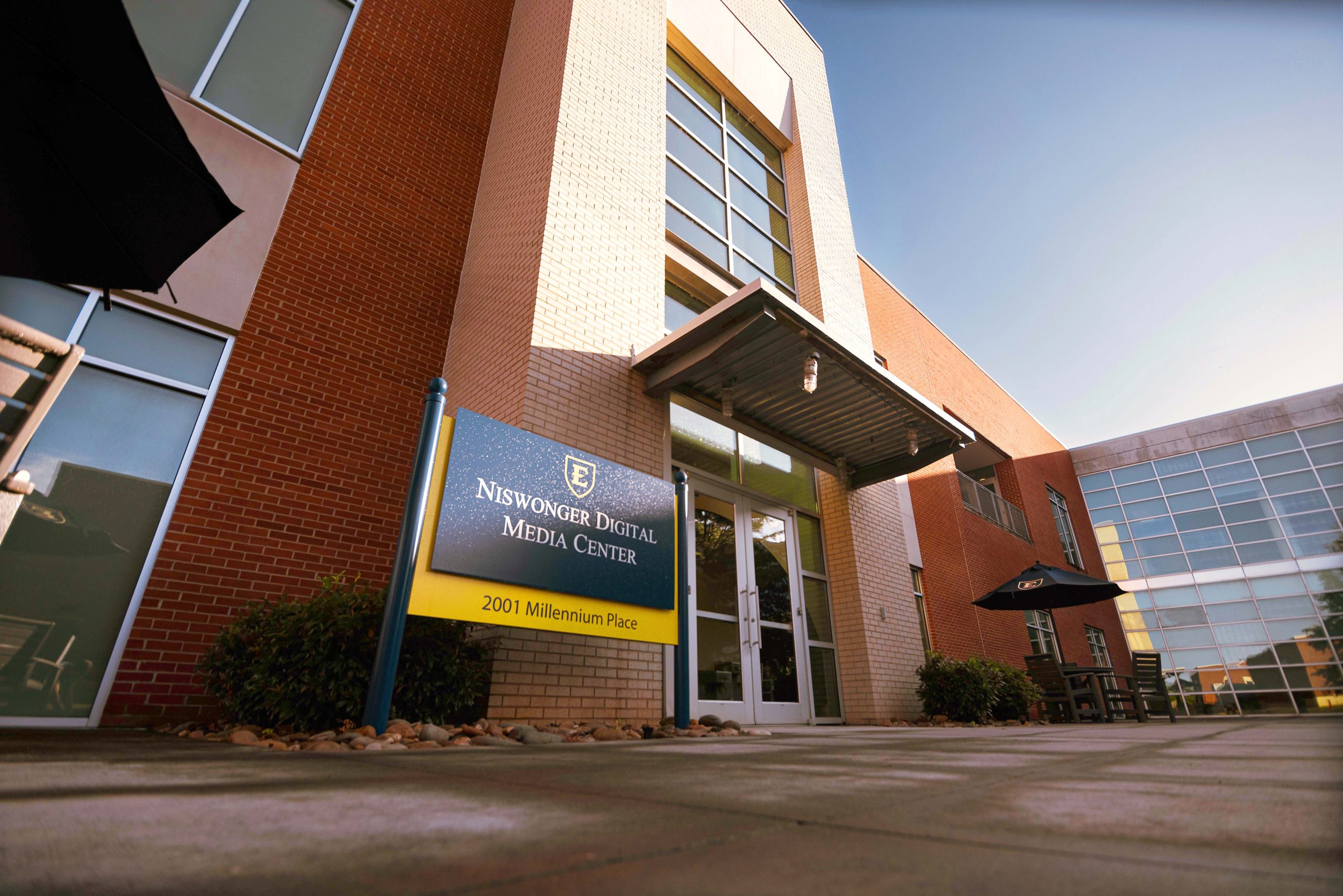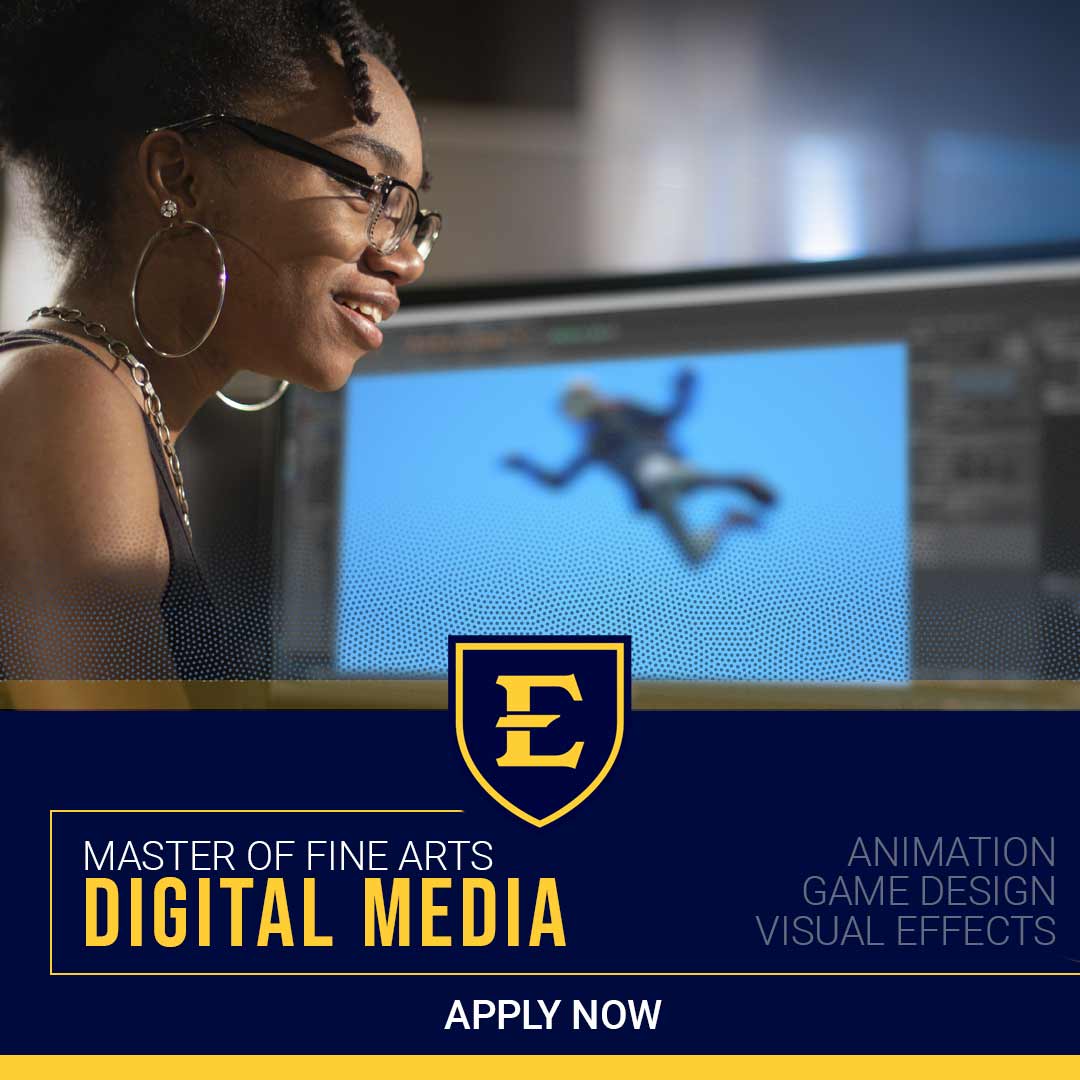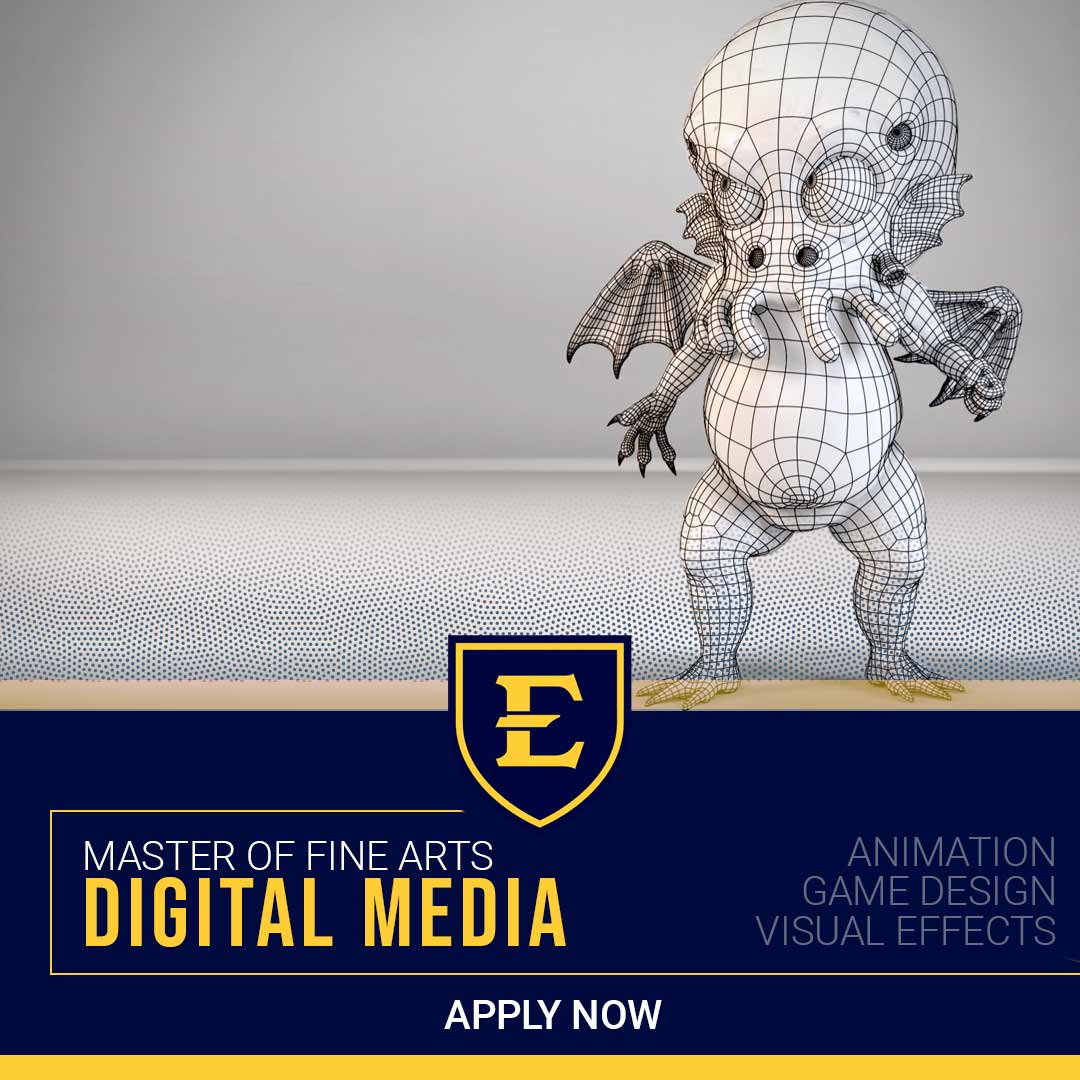The Master of Fine Art in Digital Media is the terminal degree
in the field and is designed for students who are passionate about creating original digital content in the creative economy.
The MFA in Digital Media, is designed to serve the professional creative community by both advancing learning and skills, and providing credentials for career transitions. This degree would help graduates to further develop professional, technical, and artistic skills to break into an increasingly competitive industry. M.F.A. in Digital Media at ETSU utilizes a hands-on problem-solving approach with a professional focus to prepare students to be professional digital media practitioners.
There are twelve credit hours in the degree dedicated to advancing the individuals’ skills in their digital media specialization (DIGM 5301 Solo Studio in Digital Media). There are an additional twelve credit hours dedicated towards team work in digital media projects for internal and external clients (DIGM 5302 Group Studio in Digital Media). Since digital media is a swiftly evolving field, there are six credit hours dedicated to experimenting with new technologies (Experimental Media I and II). Additionally, there are twelve credit hours dedicated to the culminating experience where individual students further develop and finalize a professional body of work for peer and faculty review (DIGM 5970 Culminating Experience).
Application Process
Admission to the M.F.A. in Digital Media follows ETSU standards for graduate admissions. This includes:
• Bachelor’s degree from a regionally-accredited institution (degrees from non-regionally accredited institutions will be reviewed individually)
• Minimum 2.5 GPA for domestic students, 3.0 GPA for international students
• Completed application form
• Essay of 150-300 words detailing the applicant’s interests in the M.F.A. in Digital Media
• Transcripts from all institutions attended
Additionally, the M.F.A. in Digital Media requires:• Three letters of professional or academic reference
• Portfolio of digital media work
• Resume
The selective process for admission to graduate study in the M.F.A. in Digital Media is based on a critical examination by Digital Media Graduate Faculty of the applicant’s academic record, the content of courses taken, synergies between the applicant’s interests and the program’s strengths, content and strength of the recommendations, and the portfolio of studio work, papers, and/or professional experience as appropriate.
Who should Apply
Are you passionate about creating digital content in the creative economy? This degree is for potential students with a bachelors degree, or returning students, who want to up their skill level by working with a team of like minded professionals.
We are looking for:
Modelers
Animators
Game Designers
Visual Effects Artists
Level Designers
Riggers
Concept Artists
Character Animators
Compositors
Cinematographers
Creature Artists
Enrivonment Artists
Coders
Look Development
Motion Graphics Artists
UI/UX Designers
3D Artists
CURRICULUM
What Classes Will I Take in the MFA?
DIGM5301 Solo Studio in Digital Media
DIGM5302 Group Studio in Digital Media
DIGM5303 Seminar in Digital Media
DIGM5910 Experimental Media
DIGM5915 Experimental Media II
MCOM5020 Media and Cultural diversities
ARTH5xxx Graduate Level Art History
DIGM5910 Digital Media Applied Research & Curriculum Development
DIGM5970 Culminating Experience
Electives
MCOM5085 Media Theory
MCOM5100 Brand Content Strategy
PUBR5310 Media Management
ACCT5000 Essentials of Accounting
MKTG5010 Essentials of Marketing
MGMT5020 Legal and Social Responsibility
COMM5300 Qualitative Research in Communication
COMM5327 Popular Communication
COMM5065 Communication Ethics
COMM5200 Gender and Communication
STOR5647 Applied Storytelling: Storytelling for a Purpose
CSCI5157 Interactive Graphics
MSDM5000 Social Media and the Brand
CUAI5199 Teaching in a Diverse Society
MEDA5400 Technology in Teaching and Learning
MGMT5617 Small Business Management
EDFN5015 Theoretical Foundations of Instructional Design
EDFN5020 Exploring Instructional Design Technology Tools
Any DIGM 5xxx not already required
Any CSCI 5xxx
Any ARTA 5xxx
Any RTVF 5xxx
Any ENTC 5xxx
Others as approved by the Digital Media graduate coordinator.
GRADUATION
The M.F.A. is a non-thesis professional degree requiring successful completion of the designated credits, including the culminating experience, for a total of at least 60 credits.
Students can be Admitted to Candidacy after having completed a semester of at least 9 credits with a 3.0 GPA. A graduate advisory committee is formed by the student in their second semester of classes and must contain three faculty members, at least two of whom must be Digital Media graduate faculty.
A comprehensive evaluation of the student’s culminating experience shall be conducted by the student’s graduate advisory committee to determine whether the student is demonstrating professional excellence in digital media. The culminating experience may vary, student to student, as demanded by their respective disciplines, and as approved by their graduate advisory committee. This culminating experience must be supported by a written document, though such a document in itself may not constitute the final body of work. Also, a record of five approved candidacy activities must be completed, submitted, and recorded by the graduate committee chair before the completion of the culminating experience. These activities may include professional works, peer reviewed shows, conferences and other faculty approved experiences.
The MFA in Digital Media will follow ETSU graduate degree and graduation requirements.

Start your next chapter with ETSU.
FOR MORE INFORMATION
For more information write to Greg Marlow, Graduate Coordinator





